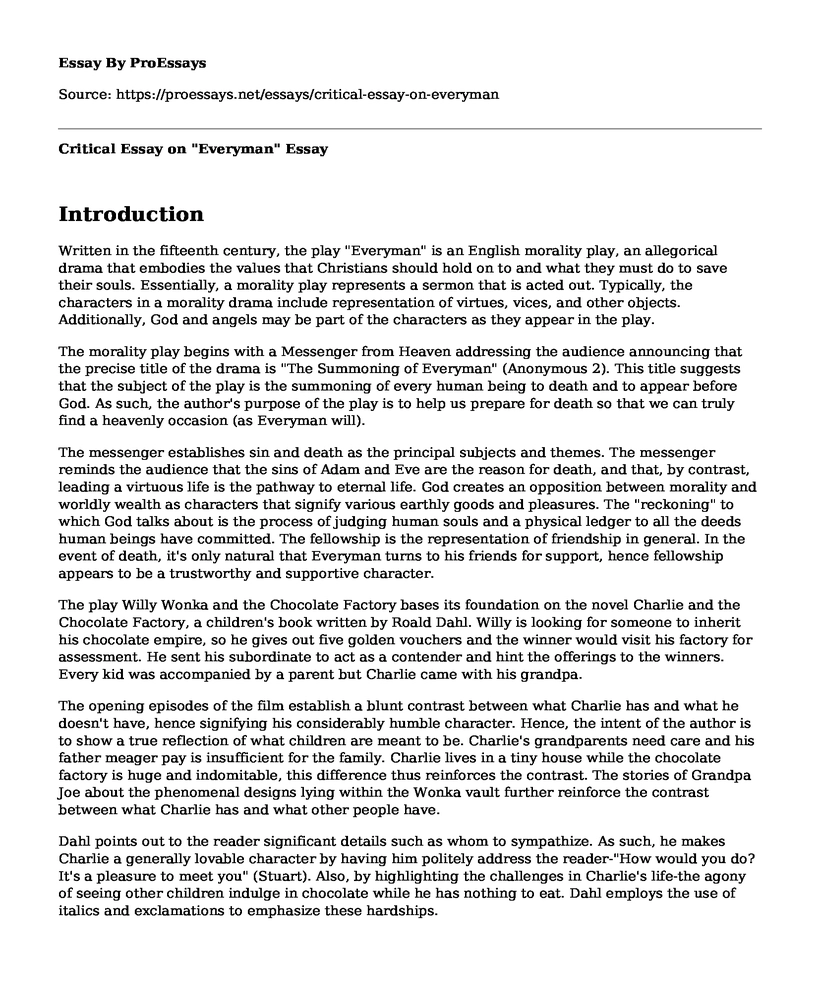Introduction
Written in the fifteenth century, the play "Everyman" is an English morality play, an allegorical drama that embodies the values that Christians should hold on to and what they must do to save their souls. Essentially, a morality play represents a sermon that is acted out. Typically, the characters in a morality drama include representation of virtues, vices, and other objects. Additionally, God and angels may be part of the characters as they appear in the play.
The morality play begins with a Messenger from Heaven addressing the audience announcing that the precise title of the drama is "The Summoning of Everyman" (Anonymous 2). This title suggests that the subject of the play is the summoning of every human being to death and to appear before God. As such, the author's purpose of the play is to help us prepare for death so that we can truly find a heavenly occasion (as Everyman will).
The messenger establishes sin and death as the principal subjects and themes. The messenger reminds the audience that the sins of Adam and Eve are the reason for death, and that, by contrast, leading a virtuous life is the pathway to eternal life. God creates an opposition between morality and worldly wealth as characters that signify various earthly goods and pleasures. The "reckoning" to which God talks about is the process of judging human souls and a physical ledger to all the deeds human beings have committed. The fellowship is the representation of friendship in general. In the event of death, it's only natural that Everyman turns to his friends for support, hence fellowship appears to be a trustworthy and supportive character.
The play Willy Wonka and the Chocolate Factory bases its foundation on the novel Charlie and the Chocolate Factory, a children's book written by Roald Dahl. Willy is looking for someone to inherit his chocolate empire, so he gives out five golden vouchers and the winner would visit his factory for assessment. He sent his subordinate to act as a contender and hint the offerings to the winners. Every kid was accompanied by a parent but Charlie came with his grandpa.
The opening episodes of the film establish a blunt contrast between what Charlie has and what he doesn't have, hence signifying his considerably humble character. Hence, the intent of the author is to show a true reflection of what children are meant to be. Charlie's grandparents need care and his father meager pay is insufficient for the family. Charlie lives in a tiny house while the chocolate factory is huge and indomitable, this difference thus reinforces the contrast. The stories of Grandpa Joe about the phenomenal designs lying within the Wonka vault further reinforce the contrast between what Charlie has and what other people have.
Dahl points out to the reader significant details such as whom to sympathize. As such, he makes Charlie a generally lovable character by having him politely address the reader-"How would you do? It's a pleasure to meet you" (Stuart). Also, by highlighting the challenges in Charlie's life-the agony of seeing other children indulge in chocolate while he has nothing to eat. Dahl employs the use of italics and exclamations to emphasize these hardships.
Conclusion
Overall, the play "Everyman emphasizes that death is inevitable. As such, one should not focus on material wealth and forget the purpose of life. Personal pleasures are simply short-lived, but the truth of the matter is that death is imminent, a bitter truth that everyman has to accept.
Works Cited
Anonymous. Everyman. Courier Corporation, 2012. Book.
Stuart, Mel. Pure Imagination: The Making of Willy Wonka and the Chocolate Factory. St. Martin's Press, 2005. Book.
Cite this page
Critical Essay on "Everyman". (2022, Jun 02). Retrieved from https://proessays.net/essays/critical-essay-on-everyman
If you are the original author of this essay and no longer wish to have it published on the ProEssays website, please click below to request its removal:
- Discharged for Off-Duty Behavior Paper Example
- How Egyptian Art Characterized Egyptian Civilization Paper Example
- Composition of the Photography Essay
- Research Paper on Security in the News: The Citrix Breach
- Essay Sample on Warner Music: Challenges of Thriving After Elimination of Tours
- Movie Analysis Essay on "Cruel Story of Youth"
- Essay Example on Bethlehem and Israel vs. Israel: An In-Depth Analysis







